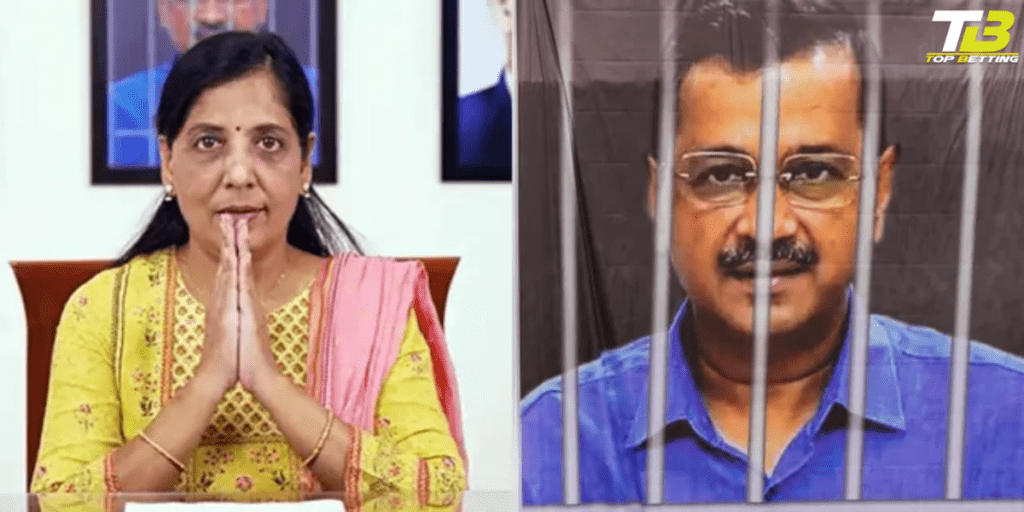
Sunita Kejriwal Allowed to Meet Delhi CM in Tihar Jail
In a significant development, Delhi Chief Minister Arvind Kejriwal’s wife, Sunita Kejriwal, has been granted permission by the Tihar jail administration to meet him. This decision comes after the Aam Aadmi Party (AAP) accused the jail administration of canceling Sunita Kejriwal’s meeting with her husband due to alleged pressure from the Modi government. Let’s delve into the details of this latest development and the reactions surrounding it.
The Alleged Cancellation
The AAP initially claimed that Sunita Kejriwal’s scheduled meeting with Arvind Kejriwal was abruptly canceled by the jail administration without providing any reason. They accused the Modi government of influencing this decision and criticized it for what they perceived as inhumane treatment.
This allegation sparked demands from the AAP for transparency in the decision-making process, highlighting broader concerns about the autonomy and fair treatment of elected officials and their families. The party’s strong reaction reflects ongoing tensions between the central government and opposition parties, particularly on issues related to governance and democratic norms. The incident underscores deeper political divisions and challenges within India’s political landscape, particularly regarding administrative accountability and institutional integrity.
Granting Permission
Despite Tihar jail officials clarifying that permission was granted for Delhi Minister Atishi’s meeting with Arvind Kejriwal on April 29, with preparations underway, the AAP persisted in questioning the government’s motives and treatment of an elected chief minister. The officials stated that Sunita Kejriwal has been meeting her husband regularly, refuting any suggestion of denial of permission.
The AAP’s ongoing scrutiny and skepticism regarding the incident reflect broader concerns about governmental transparency and the treatment of elected representatives. Their persistence in raising questions underscores a deeper sentiment within the party regarding institutional integrity and fairness in administrative processes, especially when it comes to interactions involving elected officials and their families.
Meeting Details
The AAP revealed that Sunita Kejriwal, accompanied by Delhi Cabinet Minister Atishi, met with Arvind Kejriwal at 12:30 pm on Monday. This meeting provided a valuable opportunity for the couple to connect amidst challenging circumstances, highlighting the personal impact of administrative decisions on elected officials and their families.
By emphasizing the importance of allowing family members to meet their loved ones, especially when they hold public office, the AAP underscored the human aspect of governance and the need for empathy and understanding within the political sphere.
The presence of Atishi, a prominent Delhi Cabinet Minister, at the meeting could signify both personal support for the Kejriwal family and political solidarity within the AAP. Such visible demonstrations of solidarity can bolster morale and convey a sense of unity within the party.
This disclosure by the AAP sheds light on the personal dynamics affected by governmental decisions, highlighting the intersection between public service and private life for elected officials. It also reflects broader conversations about the responsibilities and challenges faced by those in positions of leadership, both in terms of governance and personal well-being.
Reactions and Demands
The AAP’s strong reaction to the cancellation of Sunita Kejriwal’s meeting with her husband, Delhi Chief Minister Arvind Kejriwal, underscores their deep concern regarding what they perceive as mistreatment by the Modi government. The party’s response reflects broader sentiments about the autonomy and respect afforded to elected officials, particularly chief ministers.
By calling on the Modi government to explain the denial of permission for the meeting, the AAP is highlighting the importance of transparency and accountability in government actions. They argue that such treatment suggests a lack of respect for the democratic mandate and positions of elected representatives.
Comparing the denial of permission to treating a chief minister like a terrorist emphasizes the severity of their concerns and the perceived infringement on democratic norms. The AAP’s demand for a fair and transparent process for granting permissions aligns with broader principles of due process and institutional respect.
This reaction is likely to fuel further debates about federalism and the relationship between the central government and state administrations in India. It also underscores ongoing tensions and challenges within India’s political landscape, particularly regarding issues of governance, autonomy, and democratic norms.
Support from Punjab CM
Punjab Chief Minister Bhagwant Mann’s planned meeting with Arvind Kejriwal reflects a significant display of solidarity and support within the political landscape. The meeting underscores the backing that Kejriwal has garnered from like-minded leaders who share concerns over perceived mistreatment by the central government.
Bhagwant Mann’s visit not only symbolizes support for Kejriwal’s cause but also signifies a broader unity among politicians advocating for state rights and autonomy. Both leaders have been vocal about issues such as federalism and states’ rights, particularly in the context of ongoing disputes with the central government.
This meeting between Mann and Kejriwal is likely to further strengthen the relationship between the two states and their leaders, fostering cooperation on shared interests and concerns. It also sends a message of solidarity to the broader political community, highlighting the importance of unity in addressing common challenges and advocating for regional interests within the federal framework.
The gesture reflects the evolving dynamics of state-level politics in India, where regional leaders are increasingly asserting themselves and forming alliances based on shared goals and ideologies. Such collaborations can have implications beyond individual states, influencing broader political narratives and shaping the trajectory of national discourse.

Conclusion
The granting of permission for Delhi Chief Minister Arvind Kejriwal’s wife to meet him in Tihar jail is a positive development in a situation that was embroiled in controversy. The AAP’s allegations of political pressure and the subsequent cancellation of the meeting raised concerns about the treatment of an elected chief minister. However, the clarification from Tihar jail officials and the meeting taking place provide some relief and an opportunity for the couple to connect. The demand for transparency and fair treatment in such cases remains a pressing issue, and it is crucial for the government to address these concerns to uphold the democratic values of the nation.












